Source: DIGIT LEADERS
In September DIGIT reported on calls from academics at the University of Glasgow’s Centre for Computing Science Education for children as young as five to be taught basic computer skills.
According to The Herald, the introductory courses could help address the 10,000-strong vacancy gap which goes unfilled in Scottish IT roles every year.
But a UK-wide report published by The Royal Society has cast doubts on whether such strategies for improving Scotland’s digital tech scene can be implemented at all. One shocking statistic highlighted by the research paper claims that Scotland has borne a 25% decrease in the number of computing teachers since 2005.
The report raises a difficult question: is Scotland facing a computing and computer science crisis?
DIGIT reached out to Graeme Gordon, Chairman of ScotlandIS, and Polly Purvis, the organisation’s Chief Executive, to find out more about the educational challenges facing Scotland’s computing sector.

Teaching shortages
The Royal Society’s report, titled After the Reboot: Computing Education in UK Schools, shows that 17% (roughly 425 of Scotland’s 2,500 schools) do not have the teaching staff required to deliver the learning outcomes of the computing courses on offer.
Graeme told DIGIT: “We have a teaching shortage, and when you get into the more specialised areas obviously that becomes more acute. Certainly in the more modern teaching subjects – and computing is a modern teaching subject – there’s obviously a smaller pool.
“What we don’t want is a nation of coders, just as we don’t want a nation of doctors, lawyers, truck drivers. What we want is that mixed working environment, that mixed economy that we all live in. Should we be showing our kids at school how to use the technology that is there every day better, more safely? Of-course we should, in the same ways we do with every other skill.”
“We should have the opportunity to teach more kids and young people at school about computer sciences as a career path, whether that’s software, sensors, computers themselves, VR headsets, or drones – all these things fit into more advanced computer science skills. It’s not just about coding, it’s much more about the digital environment that people are living in,”

Polly explained that initiatives are having an effect on Scotland’s declining teaching pool, but keeping the nation’s head above water is proving difficult. She said: “This [shortage] is recognised by Education Scotland and the Scottish Government. The ICT & Digital Technologies Skills Investment Plan work is already underway, supporting existing computing teachers to keep their professional knowledge and skills right up to date, and to bring new teachers into schools through greater numbers of specialist teacher training places.
“However this is not an easy challenge and we are continuing to lose computing teachers faster than we can recruit and train new ones.”
Pupil participation
Even worse, according to the Royal Society the dwindling number of teachers in the talent pool are outpaced by a decline in overall pupil enrolment in computing courses, dropping 11% since 2005. This decrease means that the declining supply cannot keep up with the declining demand. The Royal Society’s report details that in females Advanced Higher-level uptake of computing studies is currently no more than 14%.
Furthermore, The Royal Society reports that the number of first-year students on computing initial teacher training courses has dropped by 80% over the last nine years. As a result, some universities have been forced to drop their PGCE in computer science, which could lead to a perpetuation of the student-teacher decline.
With student-teacher declines in mind, Polly hypothesised what a general lack of participation could lead to: “As the whole world goes digital it is essential that Scotland develops the technology products and services of the future. Our economic prosperity will depend on making sure all our young people can be skilled contributors to the technology workforce.
“If we don’t address the issue we will fall behind, as other countries are prioritising the teaching of computer science in schools.”
Graeme contests that technological innovation has long been a part of Scottish history, and there is no reason why this should not be enhanced in the digital age. Graeme said: “I think that Scotland has been an engineering society forever. We’ve been caught up now by the rest of the world, but that doesn’t mean that we’ve gotten any worse at it.
“I still think we produce some of the best engineering, whether that’s software, hardware, electrical or space-tech – there’s no doubt about that. But we need to increase the volume of people coming through our system. We’ve got great quality there – [and] it could be better, it could be more industry relevant – but we need to increase the volume of it so we can capitalise on the reality: that Scotland is a great place to be educated. Let’s take that forward into a digital age and continue that theme through.”
Despite Scotland’s rich heritage in technology, and the ubiquitous nature of digital tech, the numbers have caused The Royal Society to brand computer science in Scotland as a ‘long established discrete’ subject.
Fighting back
But aspects of Scotland’s rich technological heritage do endure in programmes today which are encouraging more Scottish people into tech. The Digital Xtra fund, for example, raises and distributes funds to organisations engaged in advancing technology, digital and computer science education across Scotland. These projects include the Rampaging Chariots Guild – an introductory robotics module already active in over 250 Scottish schools. Other initiatives include Apps for Good, which teaches 10-16-year-olds to design, market and build apps for causes that they care about in their local communities. More recently, the fund is releasing a pot of £50,000 to 11 tech-programmes.
Initiatives such as Digital Xtra aren’t only available to younger audiences, as both Graeme and Polly pointed out. CodeClan, the first UK digital skills academy to be recognised by the SQA, offers 16-week coding courses to adults as well as students. Perhaps surprisingly, the average age of a CodeClan cohort is 32 years-old.
Polly also noted a number of tech initiatives aimed towards redressing gender-imbalances in Scotland’s digital landscape. Organisations such as SmartStems specifically focus on encouraging more young women into tech, through its offering of Hub and Outreach programmes which look at areas such as VR, programming and engineering.
Despite these promising signs, Polly reminded DIGIT: “All these groups and the Digital Xtra Fund are all under-resourced, so we are in effect only creating a sticking plaster for the underlying issue.”
Graeme suggested that by utilising the gig-economy model in digital education, teacher shortages could be addressed in a more substantive. Graeme said: “You could use the gig economy model where you’ve got coders who may be lending time to code clubs and so on. [They] could come in and support the learning environment by saying, ‘Look, this could be a career choice for you,’ and not just using Word and Excel and so on.
“We should be opening more people’s eyes to the opportunities that computing, computing software, software engineering, data analytics and data science offer. We have a missed opportunity there.”
Industry Evangelists
Beyond a paucity of teachers, Graeme also pointed towards a lack of active engagement from professionals within the digital industries as both a problem and an opportunity: “I think one of the biggest things when it comes to education is [that] parents tend to devolve education to schools and universities.
“Because we’re in the digital space, I think as parents, aunts, uncles, cousins and friends, you owe it to pay that back. We as people who are out there and doing this owe it to speak to our nieces, nephews, cousins, sons, daughters, brothers: ‘Hey this is what a career in digital looks like. This is what you could be doing. This is what I do.’ And we’re not doing that enough, and that’s because it’s sometimes difficult to do so, but it’s also because sometimes we’re reluctant to do so. We should be telling people about, ‘How great my job is’.”
Graeme concluded: “You’re never too young to start exercising, and the benefits in later life you never realise when you’re 16– it’s how we introduce that blended environment for using technology as an enabler, not as a novelty.”
 Digital Xtra Fund was originally established in 2016 and funded through the Digital Scotland Business Excellence Partnership. In March 2017, Digital Xtra Fund was spun out as an independent charity to enable it to work with a wider range of industry partners, with BT Scotland signing up to support the Fund from the outset. Last year, the Fund awarded grant awards for 11 exciting, high-quality initiatives across Scotland ranging from robotic competitions to designing model Formula 1 cars.
Digital Xtra Fund was originally established in 2016 and funded through the Digital Scotland Business Excellence Partnership. In March 2017, Digital Xtra Fund was spun out as an independent charity to enable it to work with a wider range of industry partners, with BT Scotland signing up to support the Fund from the outset. Last year, the Fund awarded grant awards for 11 exciting, high-quality initiatives across Scotland ranging from robotic competitions to designing model Formula 1 cars.
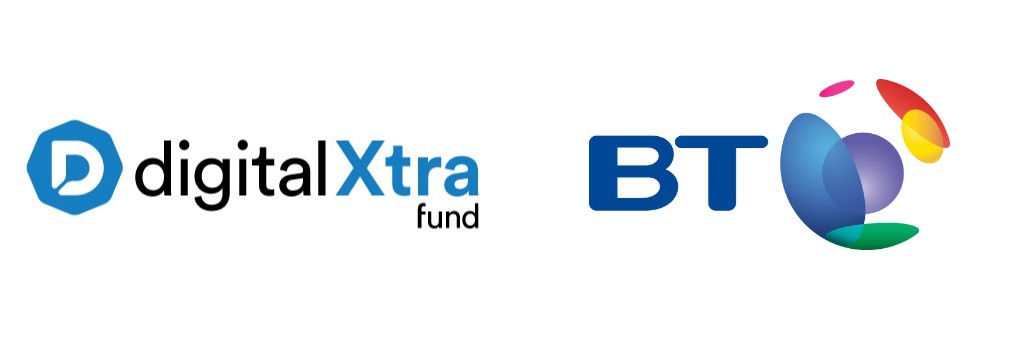
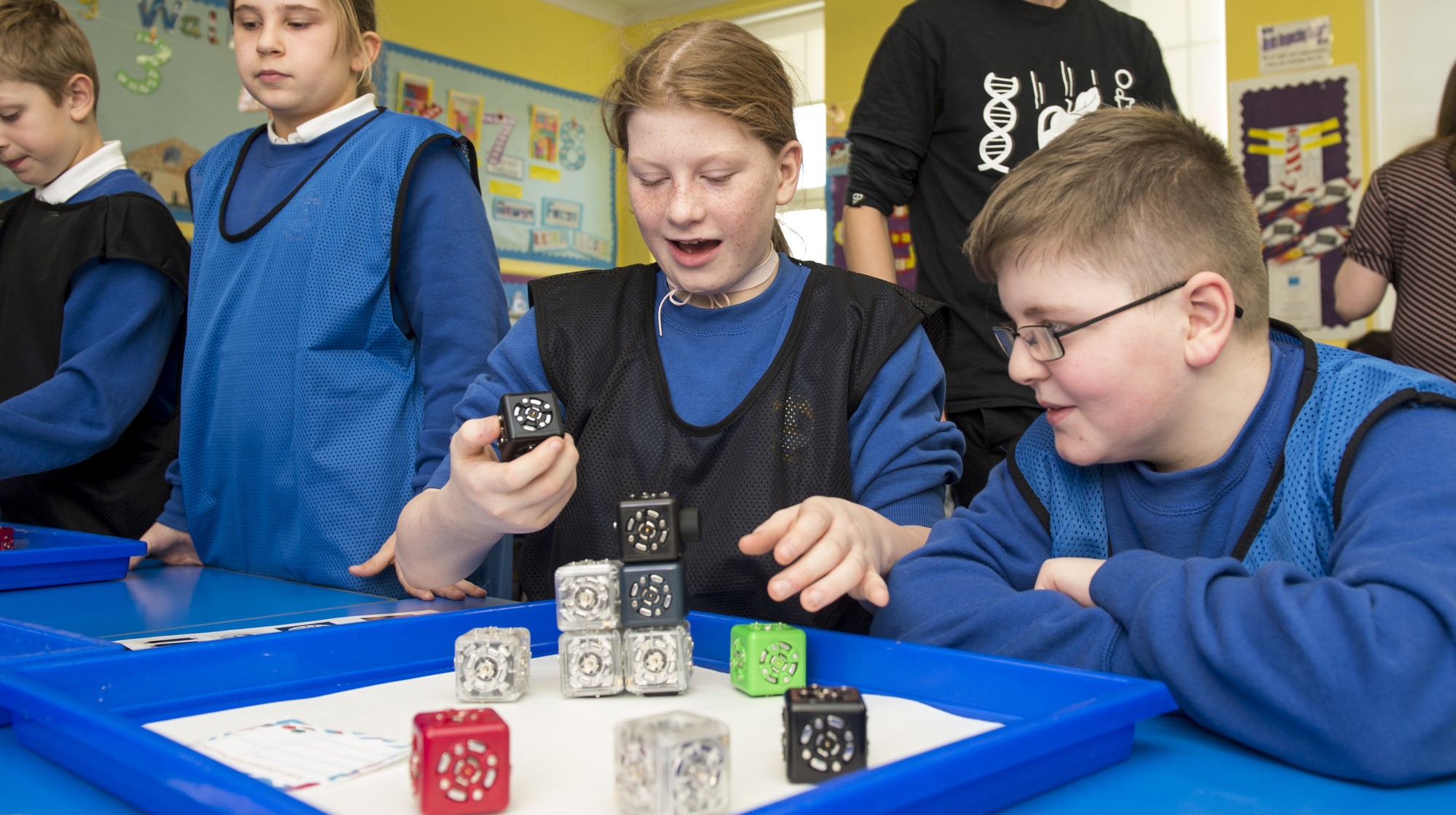
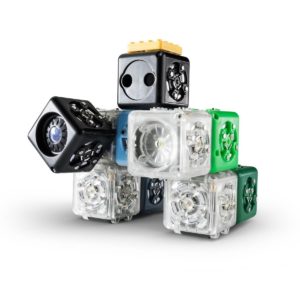
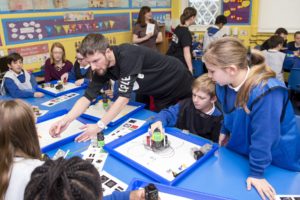 Robo Constructors is a fun, fast-moving workshop where pupils become mini-robot engineers, exploring open ended challenges to create their own novel, wacky and useful robots! Using
Robo Constructors is a fun, fast-moving workshop where pupils become mini-robot engineers, exploring open ended challenges to create their own novel, wacky and useful robots! Using 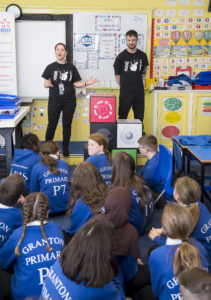 Joan Davidson, Head of Education at Edinburgh International Science Festival, spoke about how Digital Xtra Fund is helping Generation Science to engage and inspire more young people and their teachers, “Generation Science is all about supporting the provision of science education in Scottish primary schools. We do this with a team of incredibly enthusiastic science communicators whose energy and passion for delivering engaging STEM activities inspires young learners and brings technology to life in the classroom. Working with organisations such as Digital Xtra Fund enables us to reach young people across Scotland wherever they may be. With the adoption of digital as part of the definition of STEM in the STEM education and training strategy for Scotland, it is vital that our young learners and their teachers have access to inspiring and engaging activities that not only cut across the curriculum but provide bridges to life outside the classroom and the wider world of work. There are many varied opportunities for our young people to engage and develop their digital skills and we will continue to support the development of this element of young people’s learning.”
Joan Davidson, Head of Education at Edinburgh International Science Festival, spoke about how Digital Xtra Fund is helping Generation Science to engage and inspire more young people and their teachers, “Generation Science is all about supporting the provision of science education in Scottish primary schools. We do this with a team of incredibly enthusiastic science communicators whose energy and passion for delivering engaging STEM activities inspires young learners and brings technology to life in the classroom. Working with organisations such as Digital Xtra Fund enables us to reach young people across Scotland wherever they may be. With the adoption of digital as part of the definition of STEM in the STEM education and training strategy for Scotland, it is vital that our young learners and their teachers have access to inspiring and engaging activities that not only cut across the curriculum but provide bridges to life outside the classroom and the wider world of work. There are many varied opportunities for our young people to engage and develop their digital skills and we will continue to support the development of this element of young people’s learning.” Generation Science is one of 11 initiatives Digital Xtra Fund is supporting in 2018, which will introduce over 3,200 young people to high-level computing skills. This is made possible by our sponsors and funders who contribute to our goal of giving every young person in Scotland access to a digitally creative activity.
Generation Science is one of 11 initiatives Digital Xtra Fund is supporting in 2018, which will introduce over 3,200 young people to high-level computing skills. This is made possible by our sponsors and funders who contribute to our goal of giving every young person in Scotland access to a digitally creative activity. 
 Inspiring young people into STEM using robotics, coding, and teamwork is the focus of the VEX Robotics Competition, an extracurricular programme where student teams design, build, and code robots to compete in an exciting global engineering challenge set annually by the Robotics Education & Competition Foundation based in Greenville, Texas. The modular robot kits and variable challenges also promote skills such as creativity, problem-solving, and computational thinking while teaching students about the design process.
Inspiring young people into STEM using robotics, coding, and teamwork is the focus of the VEX Robotics Competition, an extracurricular programme where student teams design, build, and code robots to compete in an exciting global engineering challenge set annually by the Robotics Education & Competition Foundation based in Greenville, Texas. The modular robot kits and variable challenges also promote skills such as creativity, problem-solving, and computational thinking while teaching students about the design process.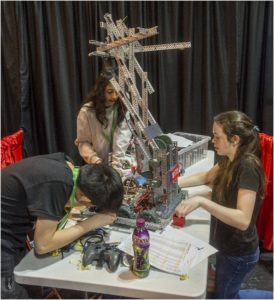 The study of robotics links to all facets of STEM and New College Lanarkshire have developed an exciting programme that encourages young people to learn through exploration via hands-on, problem-based learning experiences. This year, 38 young people aged 12-16 from Lanarkshire have taken on the challenge of becoming robot designers adopting the roles of computer programmers, CAD designers, engineers, and robot pilots.
The study of robotics links to all facets of STEM and New College Lanarkshire have developed an exciting programme that encourages young people to learn through exploration via hands-on, problem-based learning experiences. This year, 38 young people aged 12-16 from Lanarkshire have taken on the challenge of becoming robot designers adopting the roles of computer programmers, CAD designers, engineers, and robot pilots.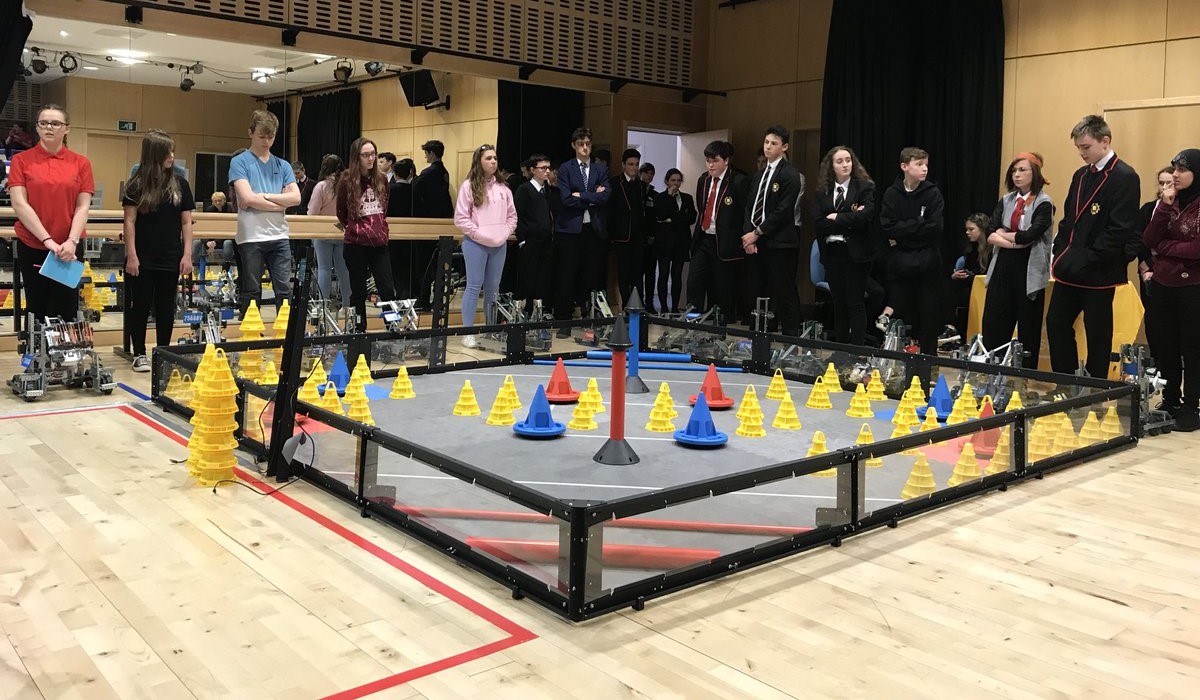 These young robot-engineers recently got a chance to show off their creations and celebrate their new digital skills at the VEX Robotics Scottish Regional Finals on 2 February at the New College Lanarkshire Motherwell Campus. Teams competed in
These young robot-engineers recently got a chance to show off their creations and celebrate their new digital skills at the VEX Robotics Scottish Regional Finals on 2 February at the New College Lanarkshire Motherwell Campus. Teams competed in 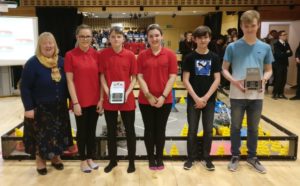 Koala-T were also winner of the Regional Design Award, judged this year by Digital Xtra Fund. The Design Award is presented to the team that best demonstrates an organised and professional approach to the design process, project and time management, and team organisation. During the robot’s design process teams must maintain an Engineering Notebook, documenting the progression of their robot from initial idea through to final testing. This helps the teams better understand the engineering design process while also practicing a variety of real life skills that will benefit in their academic and professional futures. As well as competing in the UK National Championships, this win also gives Koala-T opportunity to compete for the Design Award at the National level too!
Koala-T were also winner of the Regional Design Award, judged this year by Digital Xtra Fund. The Design Award is presented to the team that best demonstrates an organised and professional approach to the design process, project and time management, and team organisation. During the robot’s design process teams must maintain an Engineering Notebook, documenting the progression of their robot from initial idea through to final testing. This helps the teams better understand the engineering design process while also practicing a variety of real life skills that will benefit in their academic and professional futures. As well as competing in the UK National Championships, this win also gives Koala-T opportunity to compete for the Design Award at the National level too! Encouraging more young women to engage in STEM and computing science is a key aim of this initiative overall. Evidence of New College Lanarkshire’s success is apparent simply by the number of young women taking part, but it is exemplified by Power of 5 – the first all-female team from Airdrie Academy who also reached the UK Finals last year and were runner-up for the Design Award at this year’s Regional finals with their robot ‘KJ’. The team named their robot KJ after the iconic NASA mathematician, Katherine Johnson, whose computations have influenced every major space program from the Mercury missions through to the Space Shuttle, and who was the focus of 2017 film
Encouraging more young women to engage in STEM and computing science is a key aim of this initiative overall. Evidence of New College Lanarkshire’s success is apparent simply by the number of young women taking part, but it is exemplified by Power of 5 – the first all-female team from Airdrie Academy who also reached the UK Finals last year and were runner-up for the Design Award at this year’s Regional finals with their robot ‘KJ’. The team named their robot KJ after the iconic NASA mathematician, Katherine Johnson, whose computations have influenced every major space program from the Mercury missions through to the Space Shuttle, and who was the focus of 2017 film  Unfortunately, disruption across UK train services caused by the “Beast from the East” winter storm has meant Koala-T and Jamie and the Generics are unable to attend the UK National Championships later this week in Telford. Both teams are understandably disappointed as they would have loved to attend. However, Digital Xtra Fund would still like to congratulate both teams on a job well done at the Scotland event and best of luck in the future. You can follow
Unfortunately, disruption across UK train services caused by the “Beast from the East” winter storm has meant Koala-T and Jamie and the Generics are unable to attend the UK National Championships later this week in Telford. Both teams are understandably disappointed as they would have loved to attend. However, Digital Xtra Fund would still like to congratulate both teams on a job well done at the Scotland event and best of luck in the future. You can follow 
 Digital Xtra Fund was originally established in 2016 and funded through the Digital Scotland Business Excellence Partnership whose partners included Scottish Government, Skills Development Scotland, Scottish Enterprise, Highlands and Islands Enterprise, Scottish Funding Council, Education Scotland, ScotlandIS, and industry representatives. In March 2017, Digital Xtra Fund was spun out as an independent charity to enable it to work more closely with industry and address the digital skills gap. In November, the Fund awarded a total of £50,000 to 11 exciting and engaging initiatives across Scotland. Formula 1, 3D printed drones, lighthouses, and coding for social good were just some of the activities to receive support.
Digital Xtra Fund was originally established in 2016 and funded through the Digital Scotland Business Excellence Partnership whose partners included Scottish Government, Skills Development Scotland, Scottish Enterprise, Highlands and Islands Enterprise, Scottish Funding Council, Education Scotland, ScotlandIS, and industry representatives. In March 2017, Digital Xtra Fund was spun out as an independent charity to enable it to work more closely with industry and address the digital skills gap. In November, the Fund awarded a total of £50,000 to 11 exciting and engaging initiatives across Scotland. Formula 1, 3D printed drones, lighthouses, and coding for social good were just some of the activities to receive support.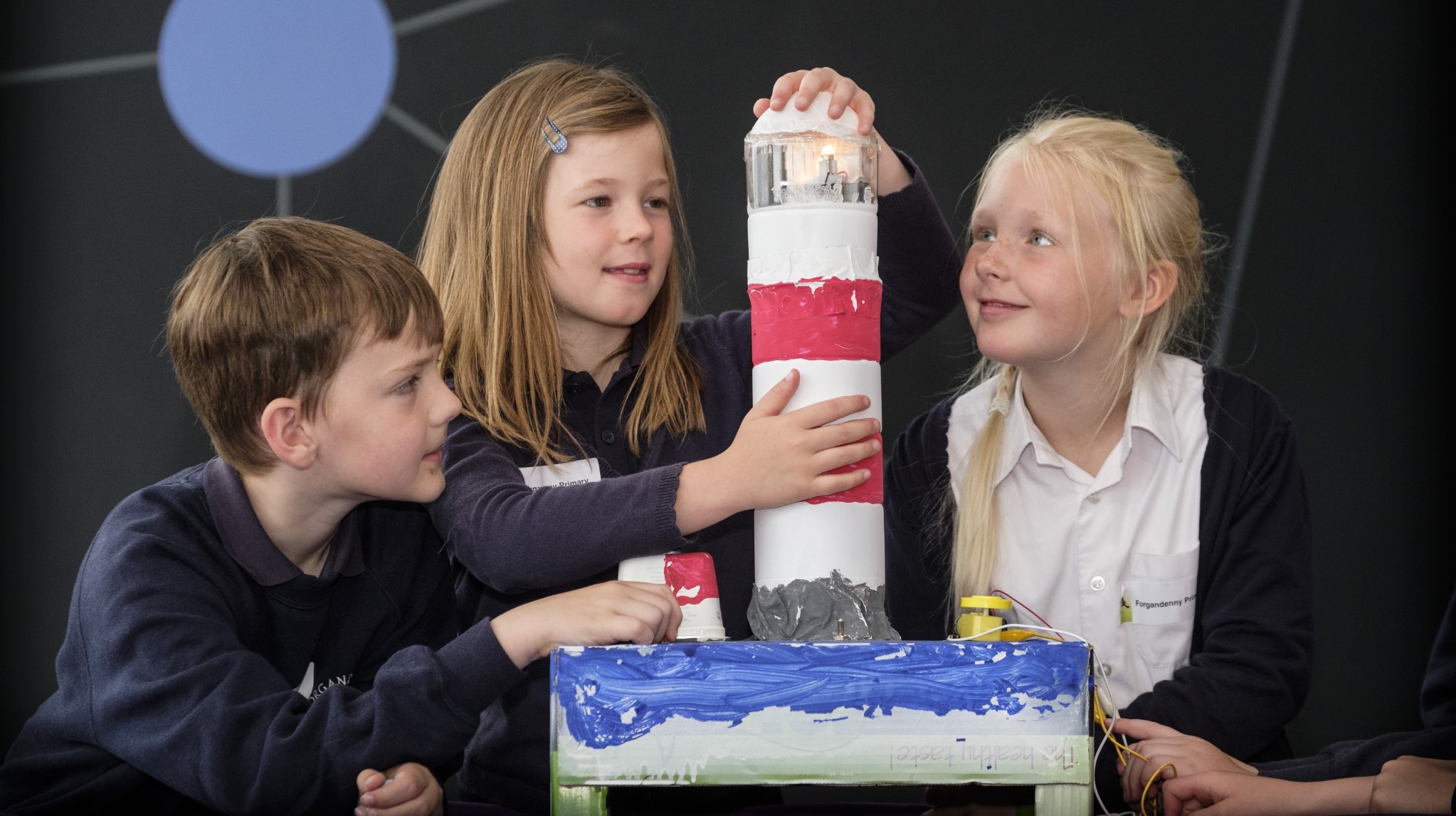
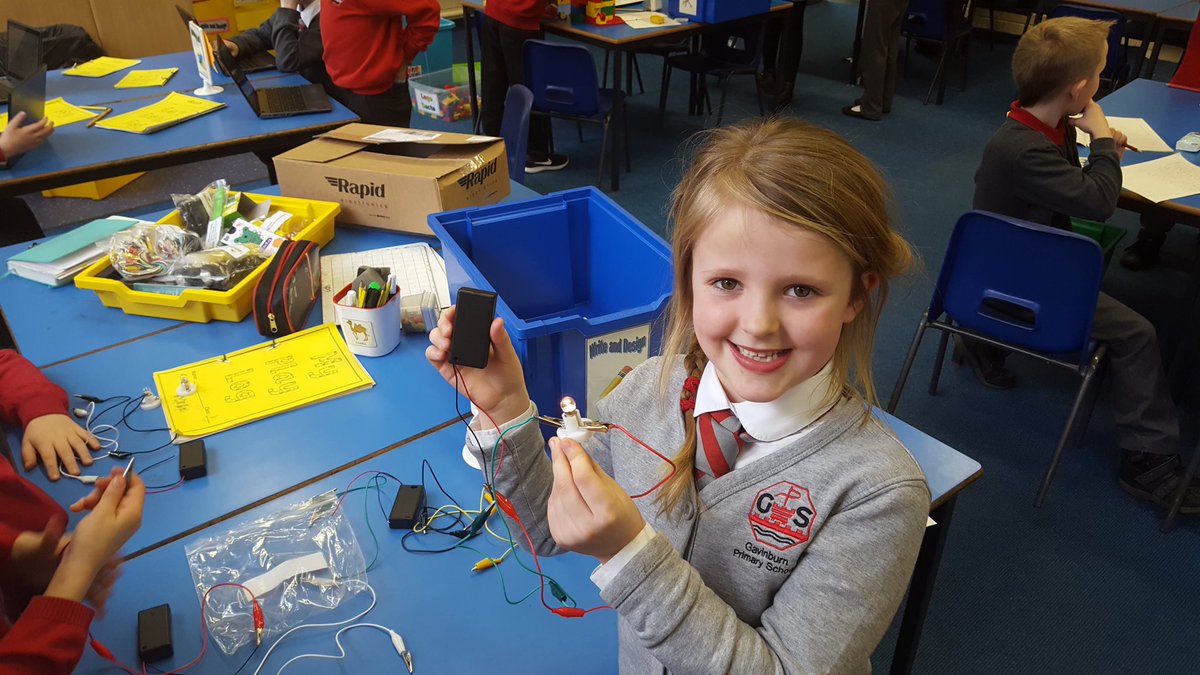 Little Lighthouse is a creative interdisciplinary programme which encourages children to combine computing science with various other science and technology concepts such electricity, design, light and sound using lighthouses as context. During the 2016/17 pilot year, YESC received support as part of Digital Xtra Fund’s second funding round to assist with the programme’s roll-out in 40 schools across Perth & Kinross, Scottish Borders, Western Isles, and Highlands. Based on the success of this initial cohort, further support was secured from Education Scotland to extend the programme across all 120 Highland primary schools and funding from the current Digital Xtra Fund grant awards will see Little Lighthouse expanded again into Argyll & Bute and Moray. This expansion will include teacher CPD courses as well as free resource kits for 18 schools in order to deliver the programme. As part of Digital Xtra Fund’s support, YESC is targeting schools that do not currently offer extracurricular computing science related activities, building the confidence and knowledge of teachers in these schools to deliver digital activities.
Little Lighthouse is a creative interdisciplinary programme which encourages children to combine computing science with various other science and technology concepts such electricity, design, light and sound using lighthouses as context. During the 2016/17 pilot year, YESC received support as part of Digital Xtra Fund’s second funding round to assist with the programme’s roll-out in 40 schools across Perth & Kinross, Scottish Borders, Western Isles, and Highlands. Based on the success of this initial cohort, further support was secured from Education Scotland to extend the programme across all 120 Highland primary schools and funding from the current Digital Xtra Fund grant awards will see Little Lighthouse expanded again into Argyll & Bute and Moray. This expansion will include teacher CPD courses as well as free resource kits for 18 schools in order to deliver the programme. As part of Digital Xtra Fund’s support, YESC is targeting schools that do not currently offer extracurricular computing science related activities, building the confidence and knowledge of teachers in these schools to deliver digital activities.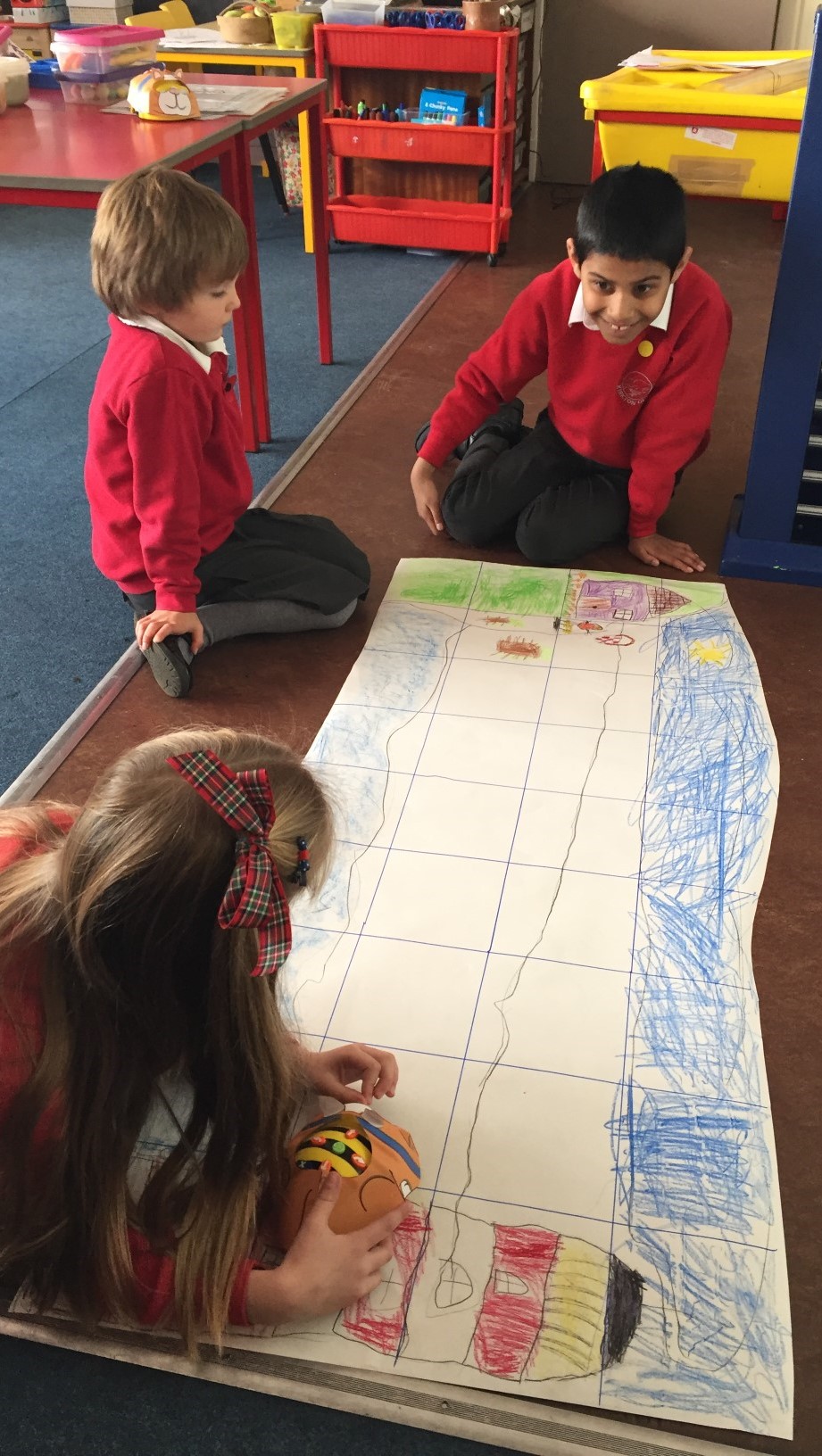 In total, 360 P2-P4 pupils in Argyll & Bute and Moray will take part in the Little Lighthouse programme learning digital concepts using Bee-Bots, CodeBugs, and Scratch. Pupils will complete eight exciting lighthouse themed modules, each building on concepts learned in the previous module. From constructing a working model lighthouse in ‘High Height’ to learning about communicating over long distances in ‘Light Delights’, by placing computing science and creativity in a real-world context alongside fun, hands-on activities, the Little Lighthouse programme helps to instil a positive attitude to digital technologies at a young age, increasing the likelihood of young people going on to choose computing science subjects at school.
In total, 360 P2-P4 pupils in Argyll & Bute and Moray will take part in the Little Lighthouse programme learning digital concepts using Bee-Bots, CodeBugs, and Scratch. Pupils will complete eight exciting lighthouse themed modules, each building on concepts learned in the previous module. From constructing a working model lighthouse in ‘High Height’ to learning about communicating over long distances in ‘Light Delights’, by placing computing science and creativity in a real-world context alongside fun, hands-on activities, the Little Lighthouse programme helps to instil a positive attitude to digital technologies at a young age, increasing the likelihood of young people going on to choose computing science subjects at school. Rebecca MacLennan, Programme Director at Young Engineers & Science Clubs Scotland, SCDI said, “Little Lighthouse is one of a range of innovative STEM projects available to schools across Scotland through SCDI’s YESC programme, supported by many partners including Digital Xtra Fund and BT Scotland. We are delighted to have support from Digital Xtra Fund to continue to grow the Little Lighthouse programme across Scotland by engaging another two local authorities. Our CPD courses have been very well received by teachers who are now enthused to use the lighthouse context to help pupils develop valuable skills including computational thinking and inspire the future workforce!”
Rebecca MacLennan, Programme Director at Young Engineers & Science Clubs Scotland, SCDI said, “Little Lighthouse is one of a range of innovative STEM projects available to schools across Scotland through SCDI’s YESC programme, supported by many partners including Digital Xtra Fund and BT Scotland. We are delighted to have support from Digital Xtra Fund to continue to grow the Little Lighthouse programme across Scotland by engaging another two local authorities. Our CPD courses have been very well received by teachers who are now enthused to use the lighthouse context to help pupils develop valuable skills including computational thinking and inspire the future workforce!”
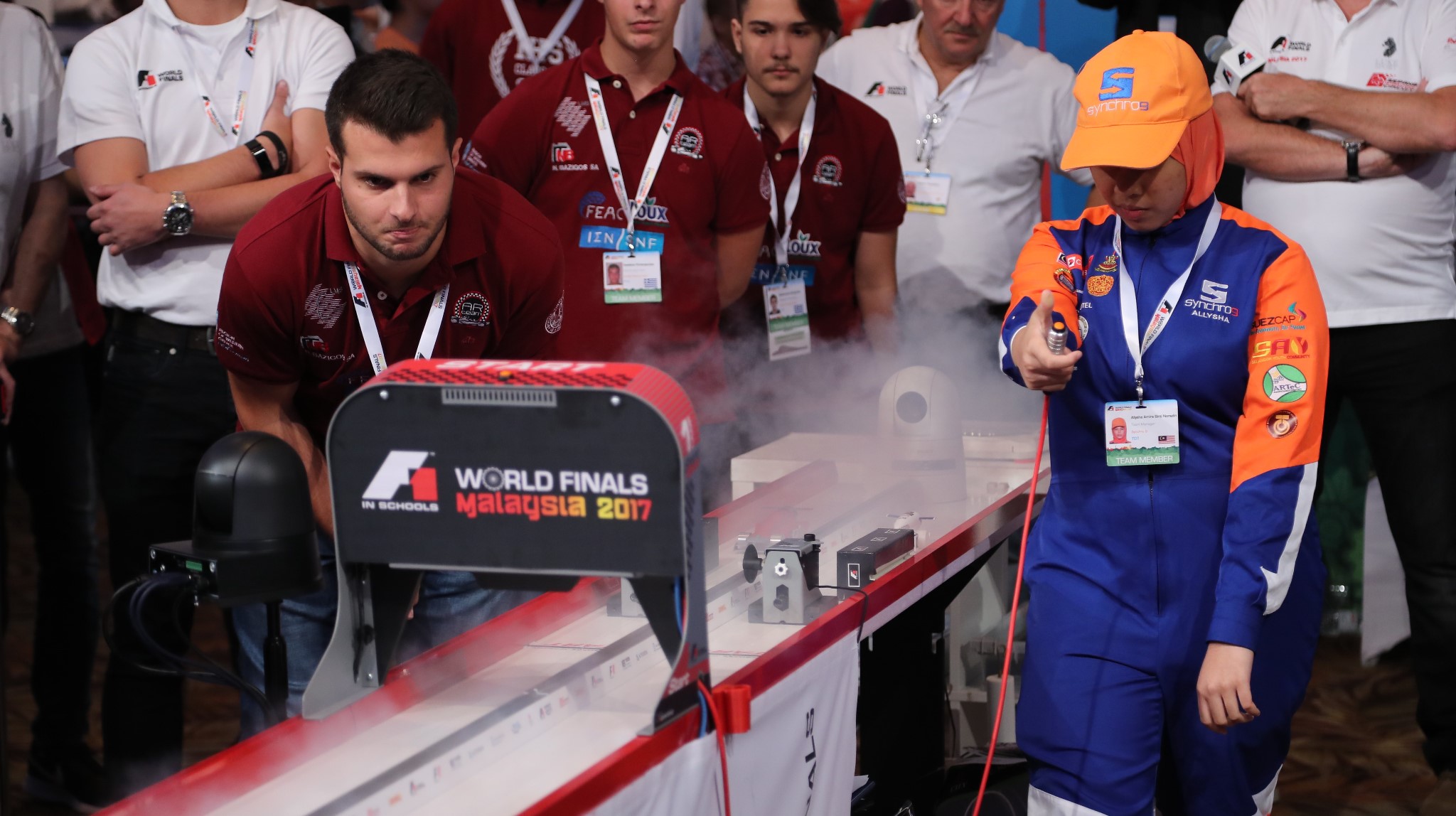

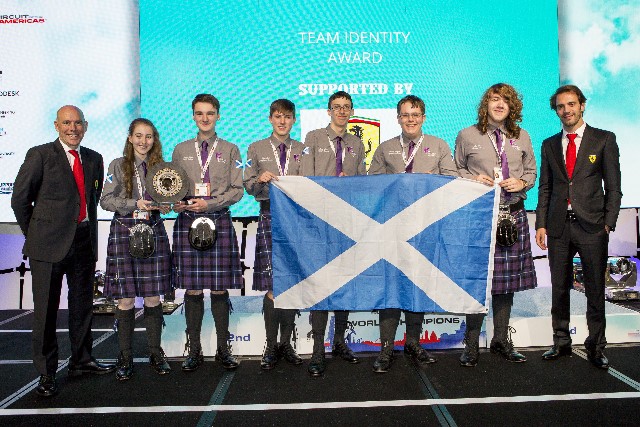 Andrew Denford, Founder and Chairman, F1 in Schools said “Scotland has always produced very strong F1 in Schools teams, with ambitious, engaged students who really relish the challenge that F1 in Schools offers them. We haven’t had a World Champion team from Scotland yet, but I’m sure it is only a matter of time, particularly with Inveralmond Community High School now having the luxury of a race track and timing system for the Scottish schools to use for track testing. We wish all the teams competing at the Scottish Finals the best of luck and we look forward to seeing the winning teams at our National Finals at Silverstone race circuit on 19th and 20th March.”
Andrew Denford, Founder and Chairman, F1 in Schools said “Scotland has always produced very strong F1 in Schools teams, with ambitious, engaged students who really relish the challenge that F1 in Schools offers them. We haven’t had a World Champion team from Scotland yet, but I’m sure it is only a matter of time, particularly with Inveralmond Community High School now having the luxury of a race track and timing system for the Scottish schools to use for track testing. We wish all the teams competing at the Scottish Finals the best of luck and we look forward to seeing the winning teams at our National Finals at Silverstone race circuit on 19th and 20th March.”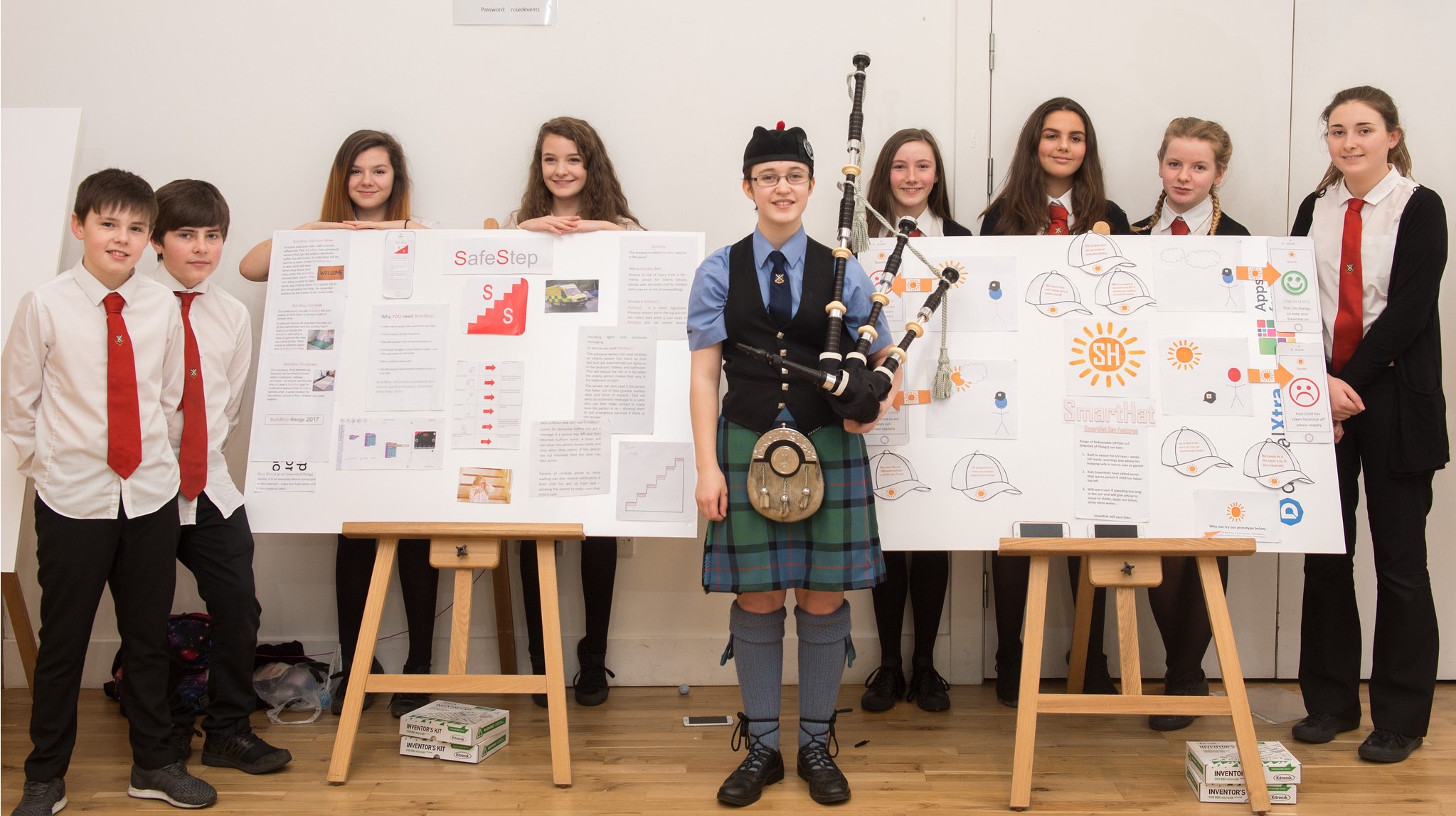
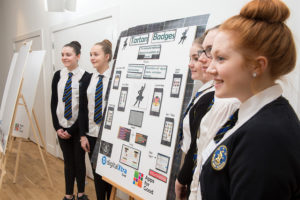 Apps for Good train teachers via their CPD programme to deliver inspirational digital courses to their pupils. Scottish pupils aged 12-16 will work together in teams to find issues they care about, then learn how to build, market and launch digital solutions by developing mobile apps and Internet of Things (IoT) products. Previous award-winning Scottish projects include:
Apps for Good train teachers via their CPD programme to deliver inspirational digital courses to their pupils. Scottish pupils aged 12-16 will work together in teams to find issues they care about, then learn how to build, market and launch digital solutions by developing mobile apps and Internet of Things (IoT) products. Previous award-winning Scottish projects include: 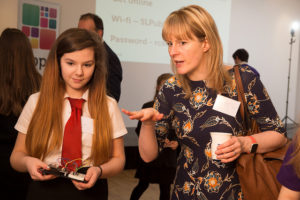 With the support of Digital Xtra Fund, participants will also get the opportunity to attend Apps for Good’s annual Edinburgh event, bringing together some of Scotland’s brightest young digital makers and entrepreneurs for a day of networking and skill development workshops. At the event the students will be showcasing their products, participating in workshops to further develop their skills and get feedback from some of Scotland’s top industry experts.
With the support of Digital Xtra Fund, participants will also get the opportunity to attend Apps for Good’s annual Edinburgh event, bringing together some of Scotland’s brightest young digital makers and entrepreneurs for a day of networking and skill development workshops. At the event the students will be showcasing their products, participating in workshops to further develop their skills and get feedback from some of Scotland’s top industry experts.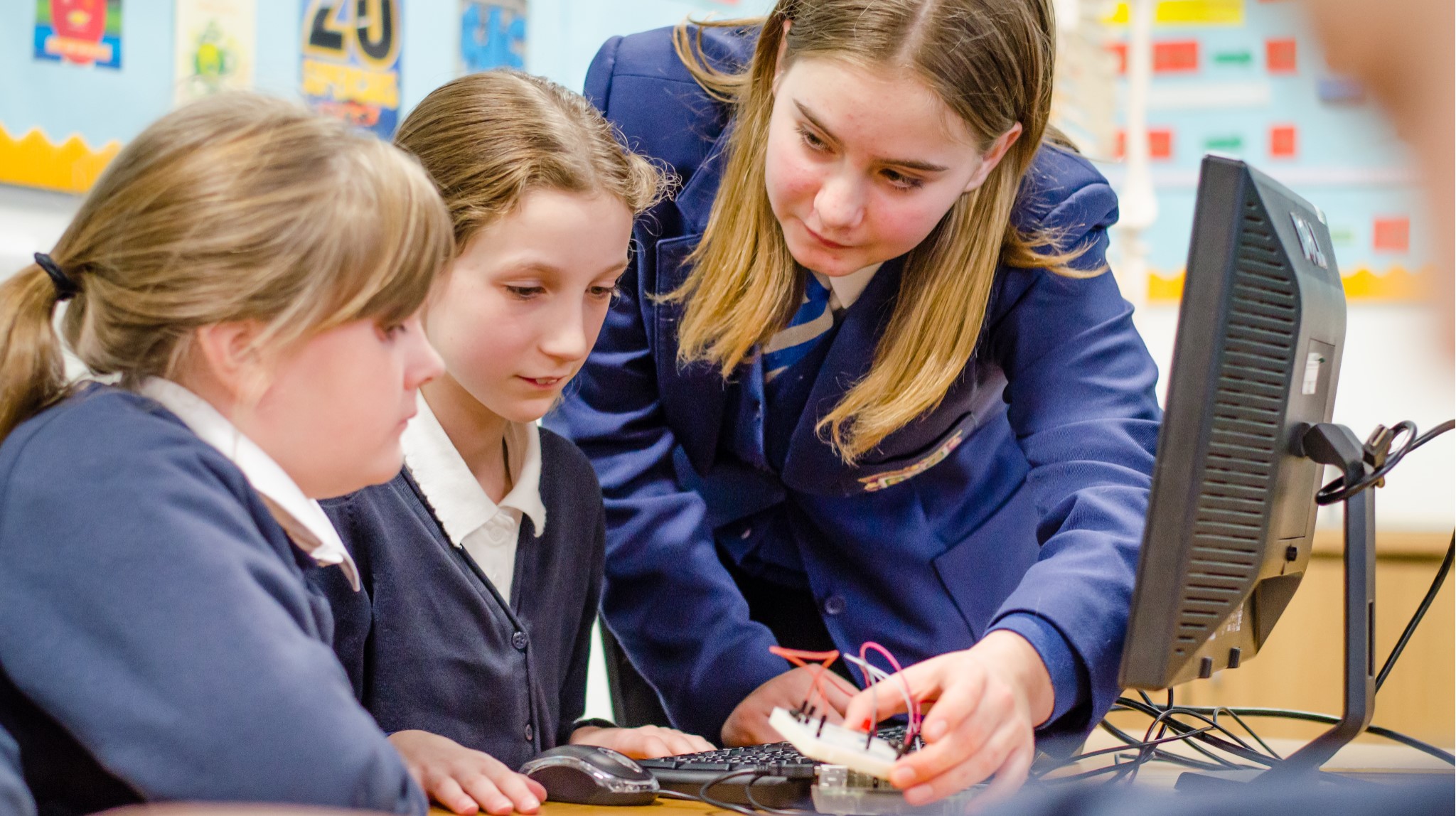
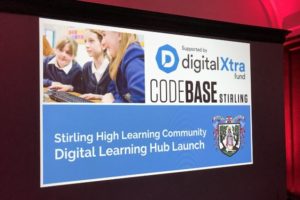 The first initiative we will look at is
The first initiative we will look at is 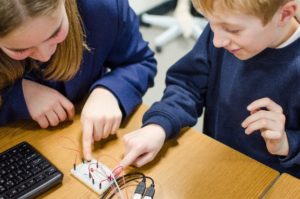 Paul Cassidy, HT Stirling High said “This project is an excellent example of how we are preparing our young people for their future through developing a range of skills including teamwork, collaboration and digital skills. Our Digital Champions in S1 and S2 are developing their leadership skills by supporting the young people from our primary schools as part of the project. The learning community is excited to be working with CodeBase Stirling and we are grateful for the support from the Digital Xtra Fund and Sharp.”
Paul Cassidy, HT Stirling High said “This project is an excellent example of how we are preparing our young people for their future through developing a range of skills including teamwork, collaboration and digital skills. Our Digital Champions in S1 and S2 are developing their leadership skills by supporting the young people from our primary schools as part of the project. The learning community is excited to be working with CodeBase Stirling and we are grateful for the support from the Digital Xtra Fund and Sharp.”
